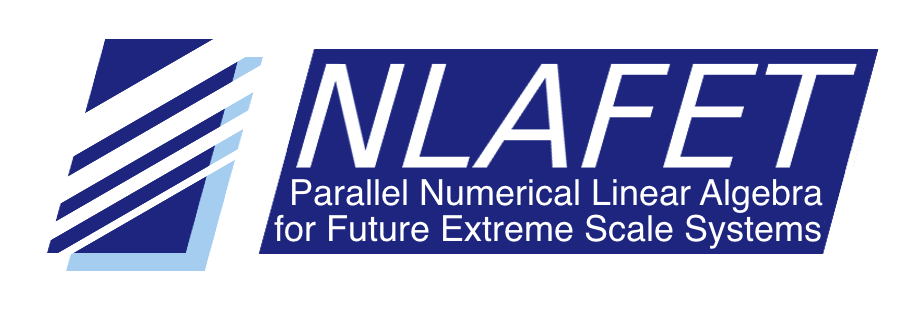NLAFET – Parallel Numerical Linear Algebra for Extreme Scale Systems, is a Horizon 2020 FET-HPC project funded by the European Union under Grant Agreement 671633.
Today’s most powerful supercomputers are composed of hundreds of thousands of computing cores (CPUs and accelerators) connected in high speed networks that make up a massively parallel high performance computing (HPC) system. To effectively utilize this capacity, access to efficient and scalable parallel algorithms and software is necessary.
The future supercomputers will be even more extremely parallel; the goal is to deliver HPC systems with a capacity of 1,000,000,000,000,000,000 (10 raised to the power 18) operations per second (one exaflop) within a few years. Such an exa-scale HPC system will also be heterogeneous and consist of millions of compute cores. This dramatic development in turn places new and challenging demands on effective scalable numerical algorithms and software libraries.
NLAFET is tackling these challenges with the goal to minimizing the gap between the peak capabilities of the hardware and the performance realized by HPC applications relying on linear algebra software. Achieving this requires a co-design effort including developing novel architecture-aware parallel algorithms, exploration of advanced scheduling strategies and runtime systems, offline and online autotuning, as well as avoiding communication and synchronization bottlenecks. Results of the NLAFET research appear in the open source NLAFET software library.
 The NLAFET consortium consists of four partners: Umeå University (UmU) in Sweden, The University of Manchester (UNIMAN) in United Kingdom, Institute National de Recherche en Informatique et en Automatique (INRIA) in Paris, France, and the Science and Technology Facilities Council (STFC) in United Kingdom. Umeå University is coordinating NLAFET.
The NLAFET consortium consists of four partners: Umeå University (UmU) in Sweden, The University of Manchester (UNIMAN) in United Kingdom, Institute National de Recherche en Informatique et en Automatique (INRIA) in Paris, France, and the Science and Technology Facilities Council (STFC) in United Kingdom. Umeå University is coordinating NLAFET.
Besides collaborations with individual researchers, representing academia and vendors, close cooperation takes place with the Innovative Computing Laboratory (ICL), UT Knoxville.
 |
 |
 |
 |
